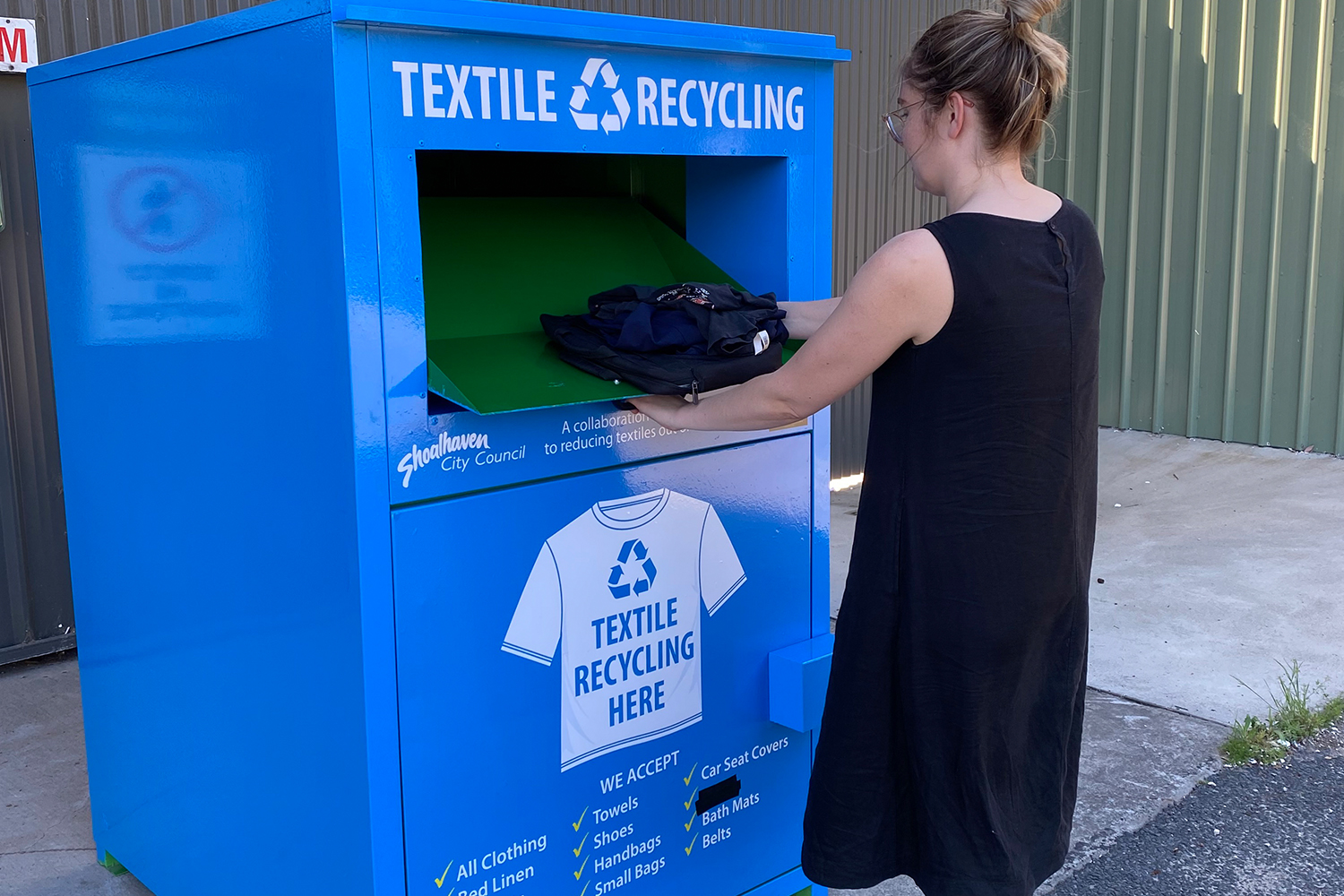
If you have unwanted clothing, shoes or handbags that are in good condition — meaning they're good enough you would happily give it to a friend — then we encourage you to donate those items to an op-shop or charity.
Reuse is always the first course of action to reduce waste. However, charities are limited in what they can accept due to storage, resale and hygiene issues. Donating (or dumping) poor quality textiles at charities becomes a costly waste disposal burden.
Council is now working in partnership with Nowra-based company DLG Australia to recycle textiles that are not fit for reuse.
Worn textiles including clothing, bed linen, towels and more, that were previously destined for landfill can now be recycled at the recycling and waste depots.
Look for our bright blue textile recycling collection bins at any of our recycling and waste depots to recycle your textiles for free!
Learn about what we can and can't accept below.
Textiles we accept
- all clothing
- bed linen
- table linen
- blankets
- cushion covers
- towels
- handbags
- small bags (such as day/backpacks and school bags)
- shoes
- curtains
- car seat covers
- rugs (small)
- bath mats
- belts
- hats
- cooler bags (textile not plastic)
Textiles we can't accept
- pillows, cushions, doonas
- mattress toppers
- sleeping bags
- items containing foam or feathered stuffing
- wet or damp items (damp items stored in the clothing bin can lead to mould which impairs the recycling process)
- suitcases or large bags
- items need to be small enough to fit through the chute (no large sporting bags)
- paint or chemical stained items
- carpet or large rugs
Tips
- items need to be of a size that can easily fit into the chute of the bin. If you would have to stuff it through the chute to put it in, it can't go in the bin.
- textiles don’t need to be spotless but they do need to be reasonably clean. Please be considerate of the staff that will be sorting the contents of these bins
- be mindful that some textiles may be made from plastics like nylon, which is not accepted. This includes contents like cooler bags, shopping bags, shower curtains, outdoor cushion cover
Using cotton as an example, this is shredded, carded and then re-spun back into reels of cotton. These reels are then used to re-manufacture items such as towels, linens, rugs and much more.
Even the difficult-to-recycle textiles are given an extra life as emergency blankets, removalist wrap, insulation, automotive interior trim, flooring and much more.
Just giving an extra life to a textile bound for landfill is a benefit. The aim is to increase the lifecycle of products as the technology improves.
Repurpose, Reuse, Recycle — This RRR Process is DLG Australia’s approach to their textile recycling operations.
Reuse
This is where high quality, perfectly re-wearable items are given a second chance to be used for original purpose. Only unstained, undamaged, high quality fits this purpose.
Repurpose
This is where collected textile can be utilised for another purpose, thus giving it extra life. An example of this would be mask making, bag/rag making or similar projects.
Recycle
Any textiles that cannot be reused or repurposed are put through our partner recycling process, where every part of the garment is recycled. This includes zippers, buttons, material and fillings.
Overseas partners
DLG Australia prides itself on its strong and transparent relationship with their counterparts in India.
India is the only country with RRR capabilities that offer federally mandated living wage conditions coupled with a strong and consistent history of compliance with the strict multi-national manufacturing requirements in relation to work, health and safety conditions and processes.
DLG Australia’s processes promote the local economy and environment in India without concerns about waste ending up buried in landfill.